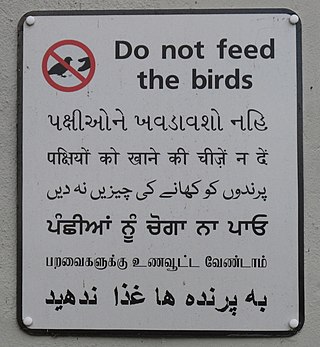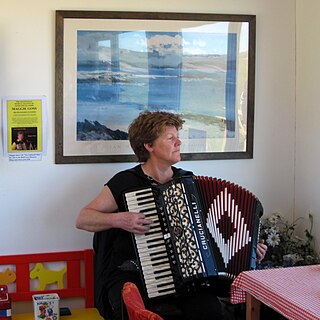British English is the set of varieties of the English language native to the island of Great Britain. More narrowly, it can refer specifically to the English language in England, or, more broadly, to the collective dialects of English throughout the British Isles taken as a single umbrella variety, for instance additionally incorporating Scottish English, Welsh English, and Ulster English. Tom McArthur in the Oxford Guide to World English acknowledges that British English shares "all the ambiguities and tensions [with] the word 'British' and as a result can be used and interpreted in two ways, more broadly or more narrowly, within a range of blurring and ambiguity".
Spoken English shows great variation across regions where it is the predominant language. The United Kingdom has a wide variety of accents, and no single "British accent" exists. This article provides an overview of the numerous identifiable variations in pronunciation. Such distinctions usually derive from the phonetic inventory of local dialects, as well as from broader differences in the Standard English of different primary-speaking populations.

The United States does not have an official language at the federal level, but the most commonly used language is English, which is the de facto national language. In addition, 32 U.S. states out of 50 and all five U.S. territories have declared English as an official language. The great majority of the U.S. population speaks only English at home. The remainder of the population speaks many other languages at home, most notably Spanish, according to the American Community Survey (ACS) of the U.S. Census Bureau; others include indigenous languages originally spoken by Native Americans, Alaska Natives, Native Hawaiians, and native populations in the U.S. unincorporated territories. Other languages were brought in by people from Europe, Africa, Asia, other parts of the Americas, and Oceania, including multiple dialects, creole languages, pidgin languages, and sign languages originating in what is now the United States. Interlingua, an international auxiliary language, was also created in the U.S.
The French language is spoken as a minority language in the United States. Roughly 2.1 million Americans over the age of five reported speaking the language at home in a federal 2010 estimate, making French the fourth most-spoken language in the nation behind English, Spanish, and Chinese.

English, in various dialects, is the most widely spoken language of the United Kingdom, but a number of regional and migrant languages are also spoken. Regional indigenous languages are Scots and Ulster Scots and the Celtic languages, Irish, Scottish Gaelic, Welsh and, as a revived language with few speakers, Cornish. British Sign Language is also used. There are also many languages spoken by immigrants who arrived recently to the United Kingdom, mainly within inner city areas; these languages are mainly from continental Europe and South Asia.
Anglicisation is a form of cultural assimilation whereby something non-English becomes assimilated into, influenced by or dominated by the culture of England. It can be socio-cultural, in which a non-English person, people or place adopt(s) the English language or English customs; institutional, in which institutions are modified to resemble or are replaced by the institutions of England or the United Kingdom; or linguistic, in which a foreign term or name is altered to become easier to say in English. It can also refer to the influence of English culture and business on other countries outside England or the United Kingdom, including media, cuisine, popular culture, technology, business practices, laws, or political systems.

The Gàidhealtachd usually refers to the Highlands and Islands of Scotland and especially the Scottish Gaelic-speaking culture of the area. The similar Irish language word Gaeltacht refers, however, solely to Irish-speaking areas.

The English language in Europe, as a native language, is mainly spoken in the United Kingdom and Ireland. Outside of these states, it has official status in Malta, the Crown Dependencies, Gibraltar and the Sovereign Base Areas of Akrotiri and Dhekelia. In the Netherlands, English has an official status as a regional language on the isles of Saba and Sint Eustatius. In other parts of Europe, English is spoken mainly by those who have learnt it as a second language, but also, to a lesser extent, natively by some expatriates from some countries in the English-speaking world.

The culture of the Falkland Islands is essentially analogous to that of British culture. The Falkland Islands have a large non-native born population, mainly white and from England, but also from Saint Helena.
Ottawa Valley English is Canadian English of the Ottawa Valley, particularly in reference to the historical local varieties of the area, now largely in decline. The accents of such traditional varieties are commonly referred to as an Ottawa Valley twang or brogue. The Ottawa Valley historically extends along the Ottawa River from northwest of Montreal through the city of Ottawa and north of Algonquin Park. The Atlas of North American English identifies an Ottawa Valley traditional dialect enclave in Arnprior, which lacks the Canadian raising of and strongly fronts before, but neither feature is documented in the City of Ottawa itself or in other nearby urban areas, which speak Standard Canadian English.

Canadian Gaelic or Cape Breton Gaelic, often known in Canadian English simply as Gaelic, is a collective term for the dialects of Scottish Gaelic spoken in Atlantic Canada.

Spanish is the language that is predominantly understood and spoken as a first or second language by nearly all of the population of Argentina. According to the latest estimations, the population is currently greater than 45 million.

Spanish is the de facto official and administrative language of Chile. It is spoken by 99.3% of the population in the form of Chilean Spanish, as well as Andean Spanish. Spanish in Chile is also referred to as "castellano". Although an officially recognized Hispanic language does not exist at the governmental level, the Constitution itself, as well as all official documents, are written in this language.
The languages of North America reflect not only that continent's indigenous peoples, but the European colonization as well. The most widely spoken languages in North America are English, Spanish, and to a lesser extent French, and especially in the Caribbean, creole languages lexified by them.

Falkland Islanders, also called Falklanders and nicknamed Kelpers, are the people of the British Overseas Territory of the Falkland Islands.

Falkland Islands English is the dialect of the English language spoken in the Falkland Islands. Though it is mainly British in character, as a result of the remoteness of the islands, the small population has developed and retains its own accent and dialect, which persists despite many immigrants from the United Kingdom in recent years. In rural areas, known as 'Camp', the Falkland accent tends to be stronger. The dialect has resemblances to Australian, New Zealand, West Country and Norfolk dialects of English, as well as Lowland Scots.
Older Southern American English is a diverse set of American English dialects of the Southern United States spoken most widely up until the American Civil War of the 1860s, before gradually transforming among its White speakers, first, by the turn of the 20th century, and, again, following the Great Depression, World War II, and, finally, the Civil Rights Movement. By the mid-20th century, among White Southerners, these local dialects had largely consolidated into, or been replaced by, a more regionally unified Southern American English. Meanwhile, among Black Southerners, these dialects transformed into a fairly stable African-American Vernacular English, now spoken nationwide among Black people. Certain features unique to older Southern U.S. English persist today, like non-rhoticity, though typically only among Black speakers or among very localized White speakers.
British Canadians primarily refers to Canadians who were either born in or can trace their ancestry to the British Isles, which includes the nations of England, Ireland, Scotland, Wales, and Northern Ireland.

Spanish is the most-widely spoken language in Ecuador, though great variations are present depending on several factors, the most important one being the geographical region where it is spoken. The three main regional variants are:

The Scottish people or Scots are an ethnic group and nation native to Scotland. Historically, they emerged in the early Middle Ages from an amalgamation of two Celtic peoples, the Picts and Gaels, who founded the Kingdom of Scotland in the 9th century. In the following two centuries, Celtic-speaking Cumbrians of Strathclyde and Germanic-speaking Angles of Northumbria became part of Scotland. In the High Middle Ages, during the 12th-century Davidian Revolution, small numbers of Norman nobles migrated to the Lowlands. In the 13th century, the Norse-Gaels of the Western Isles became part of Scotland, followed by the Norse of the Northern Isles in the 15th century.













